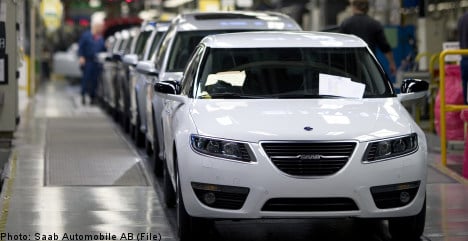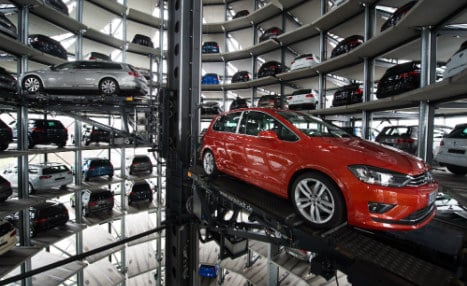“The productions line stopped yesterday afternoon. We were working building cars early this morning, but for the greater part of the day it has been disrupted and will remain stopped today,” Saab Automobile spokesperson Gunilla Gustav told AFP.
She said the carmaker lowered its overall production targets for this week and would have to decide on a day-to-day basis “when and at what pace to run the line tomorrow and on Friday.”
A local branch of Swedish public radio in western Sweden, where Saab’s Trollhättan plant is located, meanwhile reported that workers had been told there would be no production for the remainder of the week.
Saab started up production again on May 27 after a hiatus of over seven weeks because suppliers had halted deliveries over unpaid bills.
On Tuesday, it stopped production “due to disruptions in the flow of material into the plant,” said Gustav.
“We have a just-in-time production process, so we don’t have large supplies of different components. We have just enough for the production line to flow effectively,” she said.
When the system works “it works very, very well. It is very lean and sophisticated (and) extremely cost-effective,” Gustav said.
The downside, she acknowledged, is that “it is very sensitive to disruptions… It could be that 99 percent of the components are all in place, but if there is a problem with one or two parts, the whole line can be disrupted.”
Asked whether a new drawn-out production halt should be expected, Gustav said: “I’m not going to make any predictions on that.”
“We’re working as intensively as we can on getting the production line restarted… It is priority number one for the whole company,” she said.
Some suppliers meanwhile are reportedly still waiting for payments from Saab, while one supplier that focuses almost uniquely on serving the carmaker, Lear, sent all its employees home with pay for the rest of the week.
“Everyone wants Saab to survive, but the doubters are many,” Svenåke Berglie, the head of another supplier, FKG, told the TT news agency.
“What worries people the most is that they can’t add up Saab’s maths, what kind of cash flow availabilty Saab has. Is the money enough? You have to start suspecting that it’s not,” he added.
The tiny, iconic Swedish brand Saab, which employs 3,800 people, was rescued at the last minute in early 2010 when tiny Dutch company Spyker bought it for 400 million dollars from US auto giant General Motors.
Spyker originally made luxury sports cars but said in February it was selling that division to concentrate on Saab, and on Tuesday, it announced the company was changing its name to Swedish Automobile.
After initial optimistic statements and production forecasts, Spyker and Saab have recently been scrambling to pull together enough cash to keep production going.
Saab said last month it had signed a deal to obtain last-ditch rescue funding from large Chinese distributor Pang Da Automobile, just days after a deal with Chinese car manufacturer Hawtai fell through.
Pang Da has under the redistribution deal agreed to buy Saab for up to €45 million ($66 million), which according to Gustav “goes a long way.”
She stressed that the carmaker also had a number of other projects in the
making that would also soon inject in fresh cash.
“We are doing a lot of work to strengthen the capital situation within the company,” she said, pointing out that Saab was waiting among other things for approval of a joint venture with Pang Da and for the green light on a renegotiation of a bailout from the European Investment Bank that will allow it to sell its real estate and lease it back.
“And we are having negotiations and discussions with a number of suppliers when it comes to various questions about payment terms,” she said.



 Please whitelist us to continue reading.
Please whitelist us to continue reading.
Member comments